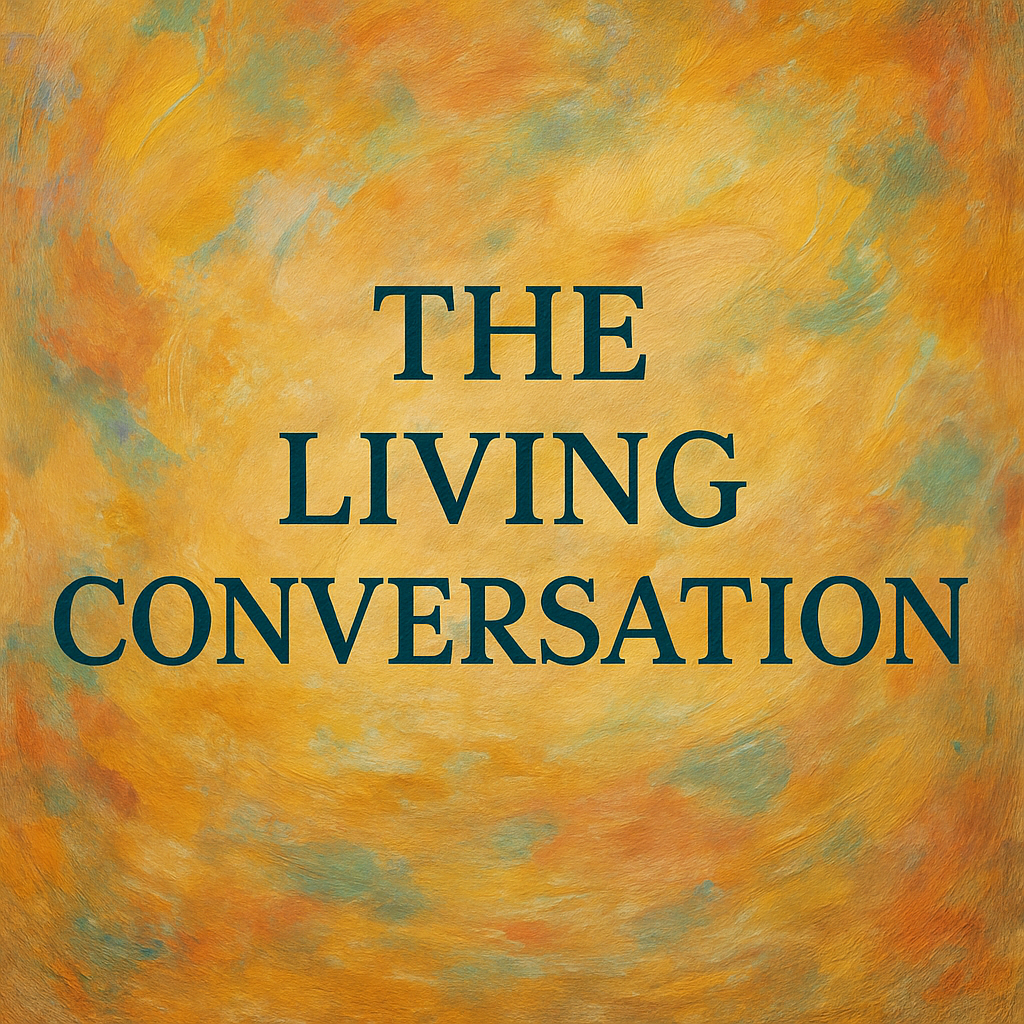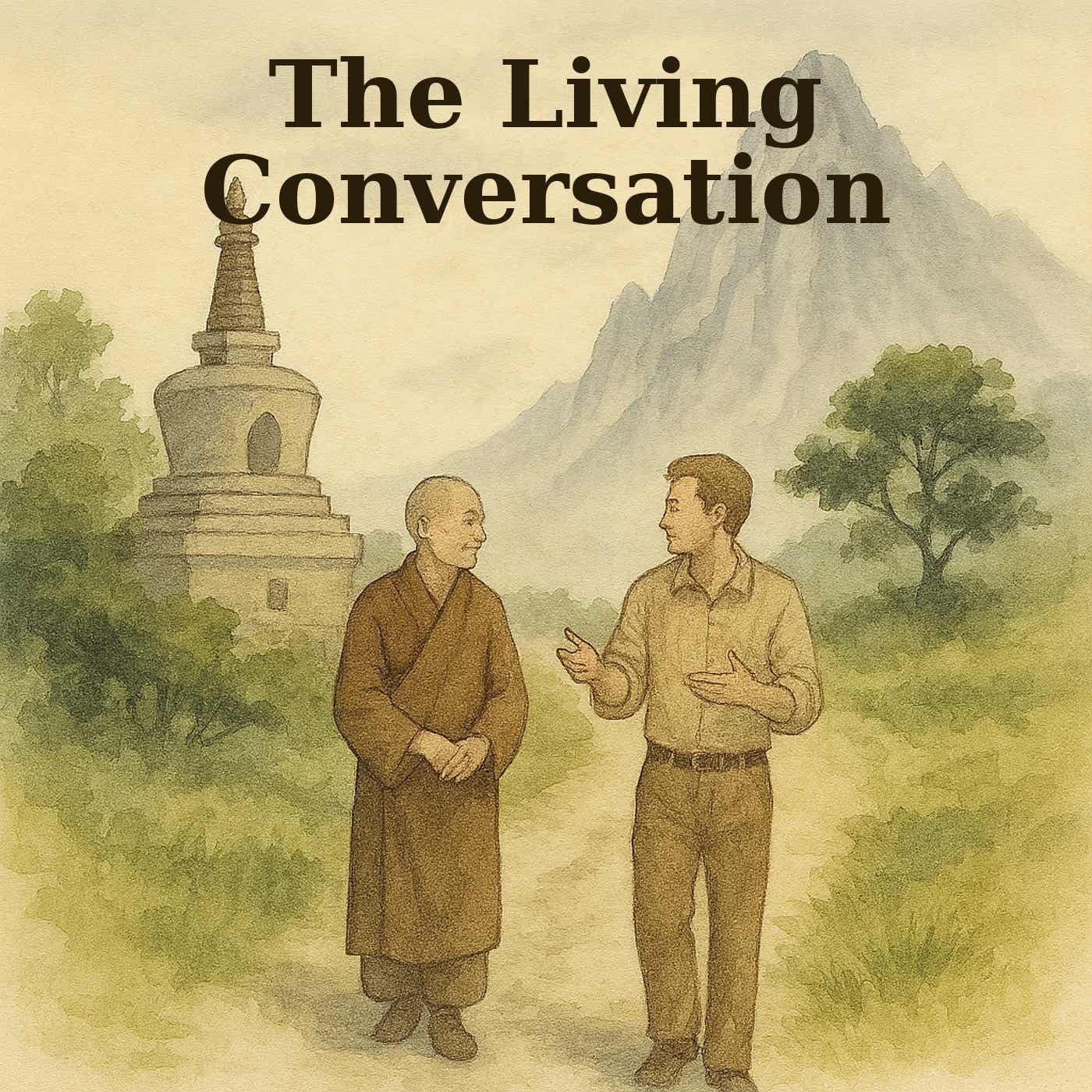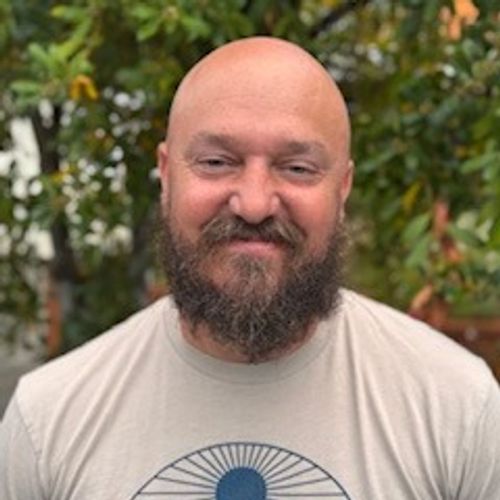How Leaders Let Go: Buddhist Mind Training in Business
What does it mean for a leader to let go?
In this episode of Attunement and the Living Conversation, Adam Dietz and Anthony Wright sit down with Nick Egan, PhD – an executive coach, scholar of Tibetan Buddhism, and student of Daoist leadership – to explore how Buddhist and Daoist wisdom can transform modern work and life.
Nick shares his journey from studying Indo-Tibetan Buddhism, including time in Nepal and training under Tibetan teachers, to coaching founders and executives in Silicon Valley. Along the way, we talk about:
- Lojong (Buddhist mind training): shifting mindset as the heart of leadership
- Daoist leadership principles: wu wei, delegation, and “effortless effort”
- Letting go in business and life: why clinging undermines leadership
- Meeting the Dalai Lama: and how presence itself can be transformative
- Meditation in modern coaching: shamatha (calm abiding), vipashyana (insight), and daily practice
Nick weaves together Buddhist philosophy, Daoist wisdom, and positive psychology to show how leaders can face uncertainty, let go of attachment, and create conditions where others thrive.
🎧 Whether you’re a leader, a seeker, or simply curious about how ancient practices apply today, this conversation offers practical insights into the art of living, and leading, with clarity and compassion.
Resources & Links:
- Nick Egan, PhD → shiftleadership.group
- Adam Dietz → The Way Between Substack
- Anthony Wright → Theonaut.com
Transcript
Foreign.
Speaker B:I'm Anthony Wright and I am your co host today on Attunement and the Living Conversation with my co host, Adam Dietz.
Speaker A:Welcome.
Speaker B:And we have a guest.
Speaker B:And our guest is Nick Egan.
Speaker B:Welcome, Nick.
Speaker A:Thank you.
Speaker A:Great to be here.
Speaker B:And you are an executive coach, but you were also a student at the California Institute of Integral Studies under Steven Goodman, who was the Tibetan Buddhist scholar.
Speaker B:So do you speak Tibetan?
Speaker A:That's true.
Speaker A:I can muddle Tibetan.
Speaker A:It was mostly classical Tibetan, so my reading is better than my speaking.
Speaker B:Okay.
Speaker A:Now it's been.
Speaker A:I'm quite out of practice.
Speaker B:Yeah.
Speaker B:But and my other question first is, has you.
Speaker B:Have you ever been in the presence of His Holiness?
Speaker A:I have, yeah.
Speaker A:His Holiness is Alaiwami?
Speaker A:Yeah.
Speaker B:Oh, that's extraordinary.
Speaker B:Oh, you did?
Speaker B:Personally.
Speaker B:Wow.
Speaker B:What an incredible energy of a.
Speaker B:Of a human being.
Speaker A:Yeah, he is.
Speaker A:He is definitely a guiding light to the world for sure.
Speaker B:And if I'm not, am I correct in understanding that he's the reincarnation of Avalakitesvara?
Speaker A:Yeah, so yes, that's correct.
Speaker A:So Avlikateshvara, the Bodhisattva of compassion, he is considered to be an incarnation.
Speaker A:So, I mean, we can get into the technicalities of it.
Speaker B:In reason, though, I'm just curious.
Speaker A:Bodhisattva would be at that level.
Speaker A:So like a high level Bodhisattva, you'd be considered like an emanation.
Speaker A:So he's the reincarnation of previous Dalai Lamas.
Speaker A:He's an emanation of that bodhisattva.
Speaker B:Oh, okay.
Speaker B:That's very useful.
Speaker B:Well, anyway, so you're.
Speaker B:You're an executive coach and you use a. I'm reading your bio.
Speaker B:Deep understanding of positive psychology and Buddhist philosophy to encourage personal and organizational growth.
Speaker B:Tell us about, first of all, how did you come to executive coaching?
Speaker A:So my undergrad was in psychology, and I thought I would become something of a therapist.
Speaker A:And at the time, I was really interested in the understanding of the mind, how the mind works.
Speaker A:And I became a bit jaded with at least the psychological principles that were given to me through that kind of cohort.
Speaker A:Not to say all of it.
Speaker A:Not the field in general.
Speaker A:Well, from there I decided, yeah, I don't want to become a therapist.
Speaker A:I want to just study what I've been practicing.
Speaker A:So I started practicing Dharma from a very young age, from the time I was 16.
Speaker A:Master, and then later under a Tibetan teacher.
Speaker A:And so then I thought, well, I'll go study philosophy and religion.
Speaker A:Did that for masters.
Speaker A:And then obviously, like Buddhism Was my chosen area.
Speaker A:So then studied Indo, Tibetan Buddhism for People, PhD, did field work in Nepal and all of that stuff.
Speaker B:Wow.
Speaker A:And then somebody came along and said actually was a friend of mine had had a coaching session.
Speaker A:I had heard about coaching, just like life coaching, executive coaching.
Speaker A:This is a long time ago, 10 years ago.
Speaker A:And she was giving away free sessions, this lady, she was an ad executive out of Chicago session a bit arrogant and thinking like, well I've been meditating for 20 years, I have all these academic degrees and stuff.
Speaker A:But in the session I thought, oh like a huge light bulb went off and thought that's exactly the kind of method that I wanted to be practicing.
Speaker A:And so I did the same training that she did.
Speaker A:And then from there if you can kind of speak fluent business, you oftentimes get tracked into the executive coaching.
Speaker A:Like coaching is just coaching.
Speaker A:Therapy is just therapy.
Speaker A:But there's different modalities.
Speaker B:So.
Speaker B:Right.
Speaker A:These days mostly what I work with is either founders, entrepreneurs, or oftentimes corporate.
Speaker B:So you doko san with executives?
Speaker A:What's that?
Speaker B:You do doko san with executives?
Speaker A:Yeah, yeah.
Speaker A:Maybe not quite as impactful.
Speaker B:Well but I mean that's so interesting that I'm learning how to speak business myself and going through an MBA program and it's really different.
Speaker B:And I'm finding that the business terms in English are really laden with certain limiting structures.
Speaker B:So for example, the idea of cost.
Speaker B:Well, wait, it's an outlay.
Speaker B:Well, it's gonna cost you.
Speaker B:Well, wow.
Speaker B:What.
Speaker B:You know, there's a lot of baggage on this stuff.
Speaker B:So what would you say that the many of the coach and particularly in these times, what many of the coaching clients are finding troubling.
Speaker B:So.
Speaker A:Usually my clients, depending on what they're doing, they struggle with things like delegation, things like letting go, delegation responsibilities, delegation.
Speaker A:So if you're a high, a high performing individual contributor or high performing at a certain level and then all of a sudden you get ramped up to.
Speaker A:Let's say you're running a team of 15 people.
Speaker B:Right.
Speaker A:You have to run a team of people that's running a team of 150 people.
Speaker B:Surprise.
Speaker A:You have to have a mindset shift.
Speaker A:Yeah.
Speaker A:So a lot of the work that I do is by is mindset shifts.
Speaker A:But it's kind of, it's a, it's hidden in the guise of strategic discussions.
Speaker A:We talk strategy, then we talk tactics.
Speaker A:But then at the heart of it it's, it's mindset, which is where the understanding of Buddhism I think comes in.
Speaker A:At least on The Tibetan side of things.
Speaker A:There's a really strong tradition around Logojong, which means, like, mind training would be considered more like.
Speaker A:What's that?
Speaker B:The name of it is called Logojun Lojong.
Speaker B:Lojong.
Speaker B:Okay.
Speaker A:Low meaning, like train.
Speaker B:Okay.
Speaker A:It's.
Speaker A:It's like reflective analysis.
Speaker A:So it's not meditation the way that most people think about it.
Speaker A:It's like thinking about cause and effect within a relational sense.
Speaker B:Okay.
Speaker B:All right.
Speaker B:And so you're assisting people to make a transition into a different mindset.
Speaker A:That's.
Speaker A:That's the whole.
Speaker A:The hope, the goal.
Speaker A:Yeah.
Speaker A:And if you can't change your mindset, you're not going to be able to actually affect change.
Speaker B:Yeah, that's right.
Speaker B:That's right.
Speaker B:So, Adam, do you have anything that you want to check in with Nick about in this line as you're speaking.
Speaker C:Already, and I know you have some similar background in also Daoism.
Speaker C:Do you find that the Daoist method of leadership can come into effect here?
Speaker A:Yeah, the.
Speaker A:The Taoist, I mean, thinking of like.
Speaker C:When you say delegating, right, then we're.
Speaker A:Like, you're letting go.
Speaker C:You're using weakness, you're not controlling results.
Speaker C:That's what I'm thinking of the Taoist philosophy in leadership.
Speaker C:Did you see that come into your practice?
Speaker A:Yeah, I mean, like Lao Tzu himself said, you know, the greatest leaders think that the people leave, the people thinking they did it themselves.
Speaker A:And that sort of mentality, it takes a great deal of strength to be able to do that in skill.
Speaker A:So I would say it's not the risk when you, when you enter into Daoism, as you know, I think is.
Speaker A:It can sound on the surface like, well, I just need to, like, let things go and let things be and all of that.
Speaker A:And that's true to some degree, but also at the same time, it's like, well, how can I create the skillful methods for people to blossom on their own?
Speaker A:Like how?
Speaker A:Like the same way I'm tending to garden.
Speaker A:So if I just let my garden totally go, it's going to be weeds or whatever, but if I find a way to skillfully tended, it's like the flowers grow on their own.
Speaker A:So, yeah, it's going to make an.
Speaker C:Effort of effortlessness, Right?
Speaker A:Exactly.
Speaker A:Yeah, an effort of effortlessness.
Speaker A:So that's a major, I think, thing for people to think about.
Speaker A:Which again goes back to the.
Speaker A:What I think is the hard work of letting go.
Speaker B:Right.
Speaker A:And same thing on, like the spiritual path.
Speaker A:You want to talk?
Speaker A:I know Adam and I have Talked about this at a deeper level.
Speaker A:If you talk about like, wu Wei or emptiness or nature of mind, depending on what traditionally using.
Speaker A:At its heart, it's like a letting go of the things that we consider our essence but are actually essences.
Speaker B:So you mean.
Speaker B:And when you say letting go, it's letting go of an attachment, is that right?
Speaker B:Or even the idea of it.
Speaker A:Yeah.
Speaker A:Letting go of an attachment, I would say, is the.
Speaker A:Is the main component.
Speaker B:Because when people are having trouble doing this mind shift, they're kind of invested in what they used to do.
Speaker B:Right?
Speaker A:Yeah, There's a.
Speaker A:There's a story.
Speaker A:And this.
Speaker A:This goes, I think, to anybody in any field.
Speaker A:There's a story that we tell ourselves that kind of reifies or makes stronger our position in the world.
Speaker A:Right.
Speaker A:I am a good blank, whatever that is.
Speaker B:But it's the.
Speaker A:I am sort of self perpetuate that.
Speaker A:Yeah, exactly.
Speaker A:So if you can kind of let go and allow that to dissipate, you'll find that on the other end, there's not death or nihilism or a negativa.
Speaker A:It's only there's like a blossoming of a more full experience.
Speaker B:And I would offer to you that in the west, that's pretty scary for folks, isn't it?
Speaker A:Well, I think anywhere, like, the promise is.
Speaker A:It's hard because there's no promise of something else, so.
Speaker B:Exactly.
Speaker A:It's like, well, if I let go.
Speaker B:Of this thing, then what?
Speaker B:Oh, my gosh.
Speaker A:Yeah.
Speaker B:Right.
Speaker A:Yeah.
Speaker A:So then you have to have a sort of trust or confidence to be able to let that go.
Speaker B:But that's where you come in.
Speaker B:As a.
Speaker B:As a.
Speaker B:As a coach, you kind of hold the space for the client.
Speaker B:Right.
Speaker B:To say, well, you know, let's.
Speaker B:Let's go hang out over here.
Speaker B:You know, and it might seem like there's nothing there, but let's see what.
Speaker B:Just notice what happens.
Speaker B:Right?
Speaker B:Is that.
Speaker B:Yeah, kind of the point.
Speaker A:That's.
Speaker A:That is a.
Speaker A:Definitely a function of it.
Speaker B:Okay.
Speaker A:Yeah, absolutely.
Speaker B:And do you still do a meditative practice or do you.
Speaker B:Do you teach a meditative practice?
Speaker A:I. I personally do meditation daily.
Speaker B:Okay.
Speaker A:I tend.
Speaker A:I do teach.
Speaker A:I do teach some techniques.
Speaker B:Okay.
Speaker A:I don't think that it's like, in my tradition in Buddhism in particular, and Tibetan traditions specifically, meditation is a pretty serious endeavor.
Speaker A:And it's geared toward not just like a worldly happiness or not just like calming, like a mindfulness calming or like a confidence or something like that.
Speaker A:Like, those would be considered very worldly elements.
Speaker A:So when I Teach people elements of meditation.
Speaker A:I think about it more along the lines of like stress relief or maybe confidence building, things like that.
Speaker A:And so I hesitate to even call them meditations.
Speaker A:It's more along affirmations and visualizations and sort of reflections.
Speaker B:But with Tibetan Buddhism and I've looked at the Robert Thurman jewelry of Tibet and also I think its name is Alan Wallace, who was a physicist.
Speaker B:Oh man.
Speaker B:But they really get into a depthful appreciation and attempt to explain that this is a really very ancient, focused and structured in a way exploration of awareness.
Speaker B:Would you say that's right?
Speaker A:Yeah, first I would say, I mean if, if people are scholarly inclined B. Alan Wallace is probably the preeminent scholar practitioner.
Speaker B:He's fantastic.
Speaker A:I can't say enough about it actually I've met him a couple times.
Speaker B:Oh you have?
Speaker A:Yeah, he's fantastic.
Speaker B:Wow.
Speaker A:Really a person of like real accomplishment.
Speaker A:Just a heavy endorsement for him.
Speaker A:What he's talking about in a lot of his books is shamata, which is.
Speaker A:Or in Tibetan it's called shine, which means like calm abiding.
Speaker A:So that what that is is what most people think of as meditation, which is there's an object of awareness that could be breath, that could be visualization, it could be energy, whatever it is.
Speaker A:And then there's your awareness and then it's just training your awareness to be stabilized with that object of awareness.
Speaker A:And once that happens, then all kinds of so called mystical states can kind of unlock.
Speaker B:Well, let's unlock it after the break.
Speaker B:I'm Anthony Wright and I am your co host with Adam Dietz.
Speaker B:Adam Dietz, you can contact me at theonaut T-H-E-O-N-A-T.com and Adam, how can people.
Speaker C:Contact you@deetsadammail.com or you can find links to all my different socials and sites.
Speaker B:At the way betweenubstack.com and our guest, Nick Egan.
Speaker B:I know that you're on LinkedIn, but how else would you prefer that People contact you?
Speaker A:LinkedIn direct messages are great.
Speaker A:Nickeganphd@LinkedIn.
Speaker A:You can also, if you're interested in Leadership Executive Coaching.
Speaker A:ShiftLeadership.group is my company and then you can reach me personally@nickeganphd.com great.
Speaker B:And that's at gmail.
Speaker A:That's just if you go on to nikeganphd.com there's a form to contact.
Speaker B:All right, we're going to take a short break and be right back, so stay tuned.
Speaker B:Sam.


